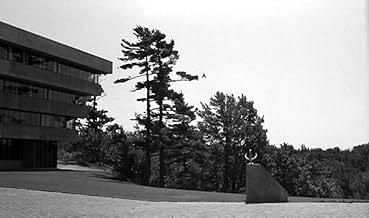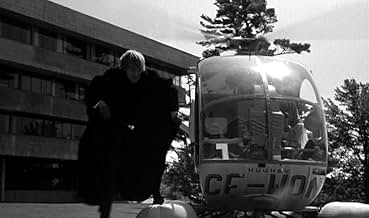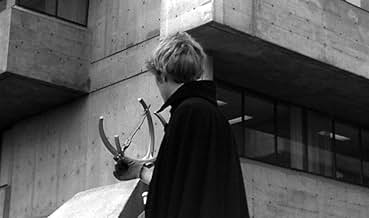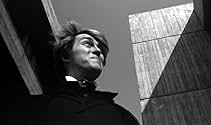Un groupe d'étudiants universitaires canadiens accepte de participer à une expérience psychologique macabre, qui les rend incapables de parler mais capables de communiquer par télépathie.Un groupe d'étudiants universitaires canadiens accepte de participer à une expérience psychologique macabre, qui les rend incapables de parler mais capables de communiquer par télépathie.Un groupe d'étudiants universitaires canadiens accepte de participer à une expérience psychologique macabre, qui les rend incapables de parler mais capables de communiquer par télépathie.
- Réalisation
- Scénario
- Casting principal
Avis à la une
Not for everyone but it's always interesting to see a well known and accomplished director's earlier work. Stereo has all of
his trademarks, it's cold, clinical and very dark. Only Cronenberg can take something like sex and make it seem like a scientific experiment.
Recommended for Cronenberg fans, others need not apply.
B+
x
While it is enjoyable to see some of Cronenberg's early stock actors at work here (some of whom would later have smaller roles in his later films), and the subject matter for the film is an obvious precursor to his later "Scanners," ultimately the darn thing will probably do little more than offer the completists out there some rather unenthusiastic bragging rights. Whatta snooze!
The film begins with the arrival at what looks like a research facility of a man wearing a black coat. As the narration begins to explain, the man is a telepath, a product of a social experiment to observe behavioural patterns between three telepaths in a closed environment. Having had their ability to speak removed, they must communicate only via telepathy, and through this telepathic bonding, begin sexual experimentation. The experiment is being carried out by the unseen Dr. Luther Stringfellow, who hopes that the powerful relationships which are forged through the telepaths - that evolve to deem such things as sex or physical attraction irrelevant - will come to replace and stabilise the traditional family unit.
If you could label Stereo as anything, it would have to be ambitious. Although the subject is purely psychoanalytical, the approach is very sci-fi. The film is black-and-white, featuring no sound at all apart from the near-constant narration, which is spoken in the same dreary tone as you would expect from a student vocalising an essay. It's quite clear than Cronenberg was held back by budget constraints and equipment, and although you could forgive the film's narrative flaws, the lack of visual appeal combined with the monotonous, jargon-heavy, quasi- intellectual narration, make the film a struggle to get through, even at only 62 minutes. It would be harsh to say Stereo is for Cronenberg die- hard's only as it is often intriguing, but the film ultimately feels like struggling to stay awake during a University lecture.
www.the-wrath-of-blog.blogspot.com
Was it a big mistake that I decided to watch this early Cronenberg art-flick before I went to bed. Maybe so, maybe not? I was fighting to keep my eyes open towards the end, but I can see why people were derailed by this experience. This oddity is real hard to get into and it only goes for about hour, but it does seem longer. Way longer! I wasn't entirely bored from this outing, but I did become rather restless in the final twenty minutes. The film is shot in black & white and there's real no sound, other than a voice-over that crops up every now again. This exhausting narration is bluntly monotonous with it's thick technical jargon that sometimes doesn't always tie in to what's happening on screen and you really have to concentrate to have a clue about what's going. At times I fell in and out of the context, but I still had some sort of an idea to what was happening. It goes on to relate telepathic power with sexual awaking, while looking into the behavioural patterns of these erotic and ESP activities and signals. Most of the time it feels like the film is meandering about aimlessly with a bunch of method actors who are just performing for a live crowd. Like a fellow has user has already mention it does feel like a documentary. While, the intellectual study might be a clever idea, but you can't help but feel disconnected from this lifeless exploration. The look of the film showcases the professional eye that Cronenberg would go on to incorporate into his latter flicks and this was his first 35mm shot project. The atmosphere has a lonely, out-of-this world feel with it's abstract backdrop that lingers on screen. The finesse and execution of such transfixed images is what kept me watching, really. This was the cold and distant style Cronenberg would go one to make his own and the sub-text of the plot shows up again in some way in the film "Scanners".
If you want to be entertained, look elsewhere because you'll mostly be frustrated. But if you want to see where it all began for Cronenberg look no further than here.
If you are looking for a film to show at a party, this is not that film. It is black and white, slow-paced and almost entirely silent. Your party people will fall asleep and call you a loser.
If you are someone who loves David Cronenberg or enjoys the study of film and camera techniques, I think you might find an interesting film here. While set up as a faux documentary about the study of "telepathists" at the "Center for Erotic Inquiry", there is very little plot and mostly just interesting scenes and visuals.
Watch the lighting, angles. Pretend you are a guest in the room, a voyeur but not a participant. Notice the dark and creepy feel, despite the fact the story itself is not creepy and no music is added. The angles and lighting alone can give the feeling of darkness and depression.
A beautiful film, and one that really laid the foundation for the next thirty years of Cronenberg greatness. His themes of medical oddities, unusual science and body horror are evident here. The exploration (voluntary or otherwise) of new states of consciousness via sexual experimentation is a major theme in "Shivers", "Videodrome", "Dead Ringers", "Naked Lunch", "M. Butterfly" and "Crash". To understand Cronenberg, one must understand this film.
Le saviez-vous
- AnecdotesDavid Cronenberg (26 at the time) secured funding for the film from the Canadian government by pretending he was writing a novel.
- Citations
Narrator #1: Now that we have some insight into the concept of experiential space, we may consider interaction among the experiential space continua of a highly unique group of individuals. In general, the study of the varying dimensions of human experience, in the context of man in his society, is known as human social cybernetics. In our experiment, eight category A subjects underwent pattern brain surgery, whose program was developed within the Academy's organic computer dialectic system. The object of surgery was to extend, by a process called biochemical induction, the natural electro-chemical network of the human brain. This extension would provide each subject with telepathic capabilities. A telepathist is one who can communicate with other minds by means which do not involve perception by the senses. Thus, telepathy is a form of extrasensory perception, or ESP. Our subjects were to be kept in isolation at the Institute for three months, where they were to prepare for their first meeting as a group. This meeting was to take place at the Academy sanatorium in the Ontario North Woods.
- ConnexionsFeatured in On Screen!: Shivers (2008)
Meilleurs choix
- How long is Stereo?Alimenté par Alexa
Détails
- Date de sortie
- Pays d’origine
- Langue
- Aussi connu sous le nom de
- Стерео
- Lieux de tournage
- University of Toronto Scarborough, Scarborough, Toronto, Ontario, Canada(aka Scarborough College, main location, all interiors and exteriors)
- Société de production
- Voir plus de crédits d'entreprise sur IMDbPro
Box-office
- Budget
- 3 500 $US (estimé)
- Durée1 heure 5 minutes
- Couleur
- Mixage
- Rapport de forme
- 1.66 : 1
Contribuer à cette page







